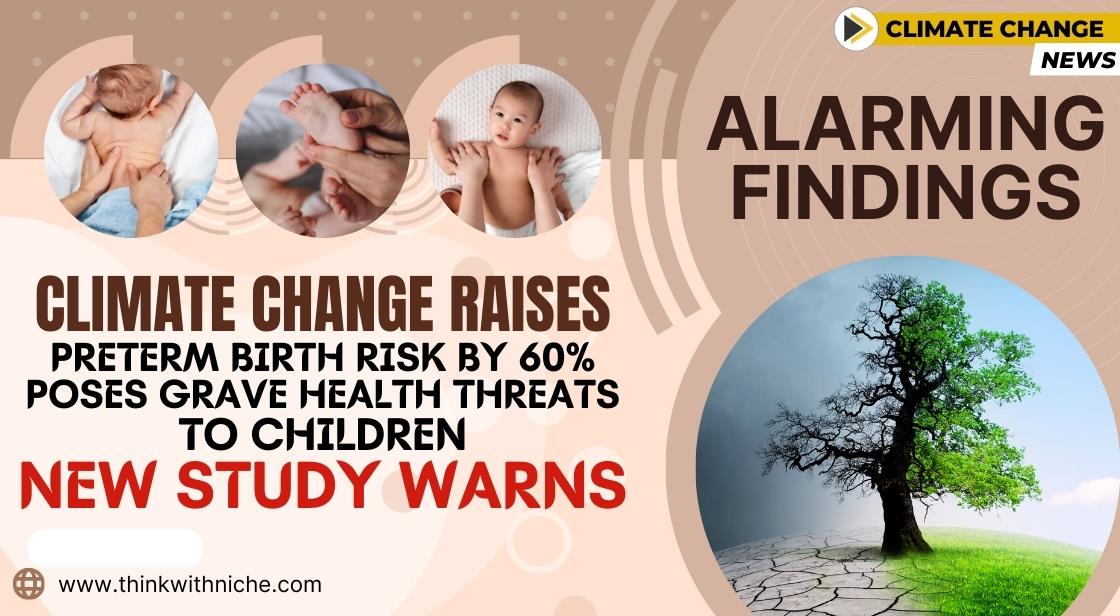Climate Change Raises Preterm Birth Risk by 60%, Poses Grave Health Threats to Children, New Study Warns

News Synopsis
Alarming research reveals that the escalating impacts of extreme climate change are significantly increasing the risk of preterm births by 60%, along with other severe health outcomes such as respiratory diseases, mortality, and increased hospitalizations for children worldwide. The findings, published in the journal Science of the Total Environment, underscore the urgent need for global action to avert a devastating impact on children's health for generations to come.
Unprecedented Health Risks: Climate Change and Children's Well-being
The world faces unprecedented health risks for children due to the intensifying impacts of extreme climate change, including a 60% increased risk of preterm births, according to a comprehensive study published in the Science of the Total Environment journal.
First-of-its-Kind Study: Connecting Climate Change to Children's Health"
While scientists have long warned about the dangers of extreme temperatures, floods, and wildfires, the newly published study is the first to systematically compile scientific evidence linking climate change to various health impacts on children, including preterm births, respiratory diseases, and mortality.
Alarming Findings: Climate Change Linked to Worsening Child Health Outcomes
-
60% Increase in Preterm Births: Exposure to extreme temperatures is associated with a staggering 60% rise in the risk of preterm birth, potentially leading to lifelong health complications for millions of children worldwide.
-
Respiratory Issues on the Rise: The study identifies a clear link between climate change and an increase in respiratory diseases in children.
-
Mortality and Morbidity Concerns: Climate change is also linked to higher child mortality rates and morbidity, highlighting the widespread impact on children's health.
Research Insights: Risk of Preterm Births and Climate Extremes
Led by Dr. Lewis Weeda from The University of Western Australia and Professor Corey Bradshaw from Flinders University, the study reviews 163 global health studies, revealing a concerning 60% increased risk of preterm births on average due to exposure to extreme temperatures.
Data Analysis: Climate Change and Direct Impact on Child Health
The research analyzes data to establish direct links between climate change and child health, highlighting the most significant impact as a 60% increased risk of preterm births. Respiratory diseases, mortality, and morbidity also show worsening trends due to climate change.
Global Health Implications: Socio-Economic Variances and Regional Differences
The study emphasizes that health risks vary across continents and socio-economic circumstances, challenging the assumption that advanced economies would be immune to the impacts of climate change on children's health. Even high-income nations face health threats, with varied impacts depending on geographical and economic factors.
Economic Consequences: The Rising Costs of Climate-Related Childhood Diseases
As climate change progresses, health risks are expected to strain families and health services, with estimated costs reaching alarming figures. For instance, a single fire season is estimated to cost up to US$1.5 billion for asthma-related issues, and the cost of a single case of childhood asthma may soar up to US$23,573 in the coming years.
Geographic Impact: Climate Change's Varied Health Consequences
The research highlights how geography influences the health impacts of climate change. In Australia, extreme temperatures correlate with increased premature births on the East Coast, Northern Territory, and Western Australia, while South Africa experiences higher mortality rates under similar temperature conditions.
Call to Action: Protecting Children from Climate-Related Diseases
Dr. Weeda stresses the urgency for action to safeguard children from climate-related diseases, urging the development of public health policies to counter the identified health risks. The study emphasizes that climate adaptation and mitigation policies are crucial for protecting current and future generations.
Global Preparedness: Addressing Threats to Child Health
The study concludes by advocating for global preparedness to address mounting threats to child health, recognizing climate change as a universal challenge affecting all countries and people. It underscores the importance of implementing solutions and policies to positively impact multiple United Nations Sustainable Development Goals.
Research Publication: Findings in the Science of the Total Environment Journal
The findings of this groundbreaking study, revealing the interconnected impacts of climate change on various health outcomes for children, have been published in the esteemed Science of the Total Environment journal.
Call for Global Collaboration and Sustainable Solutions
The study underscores the urgency of finding solutions and implementing effective climate adaptation and mitigation strategies. Such measures can positively impact various UN Sustainable Development Goals, promoting a healthier future for children worldwide.
You May Like









